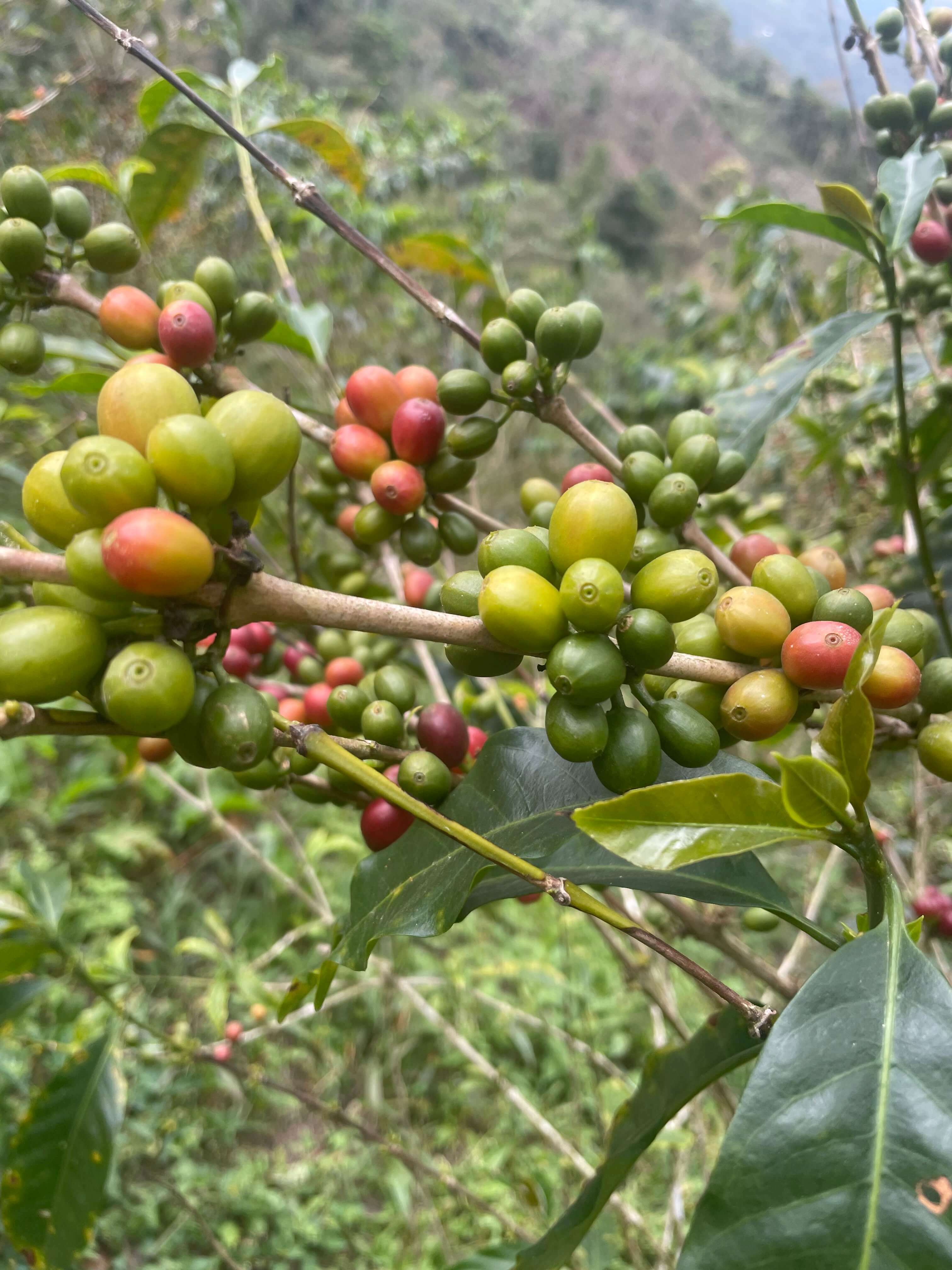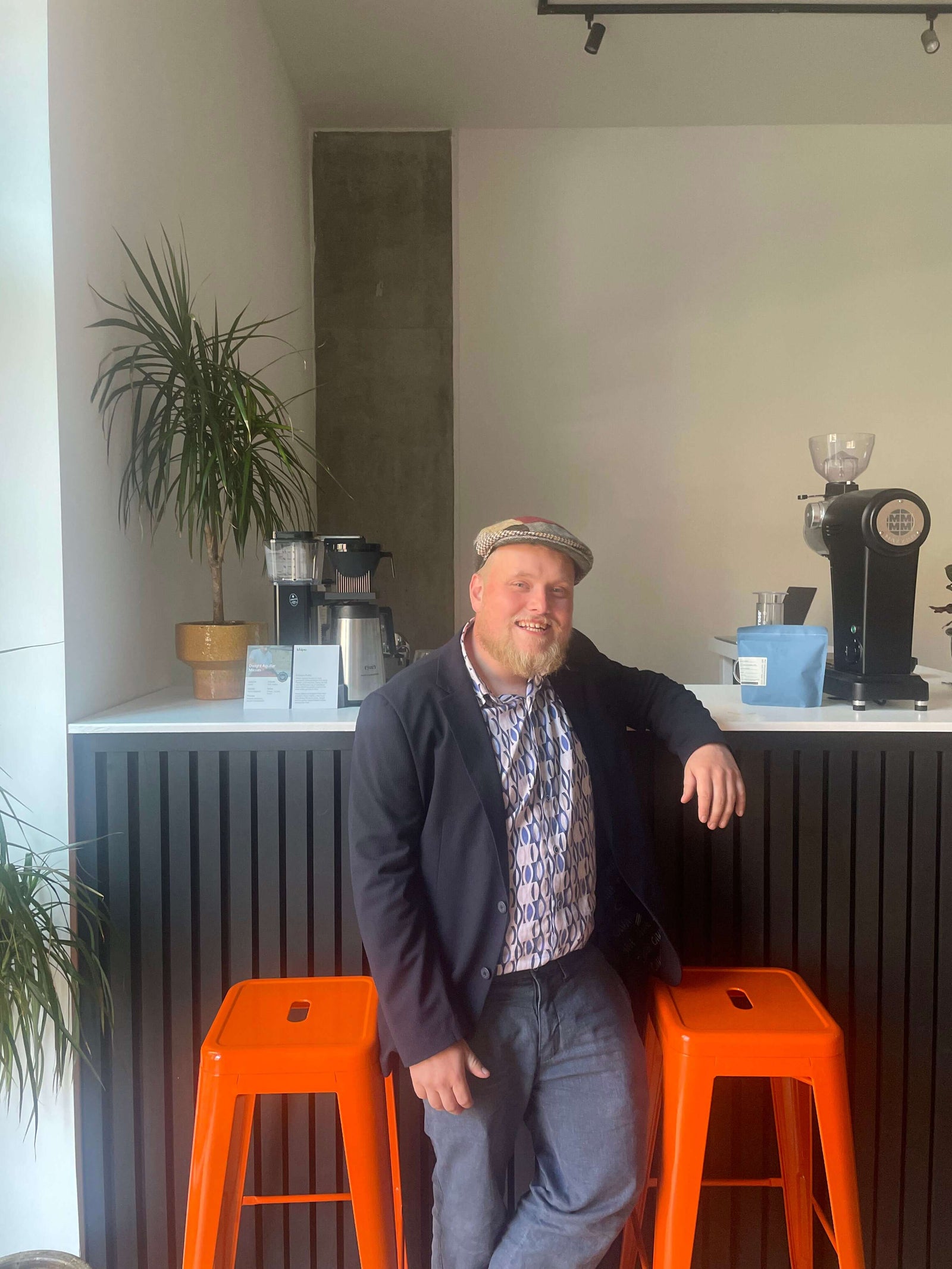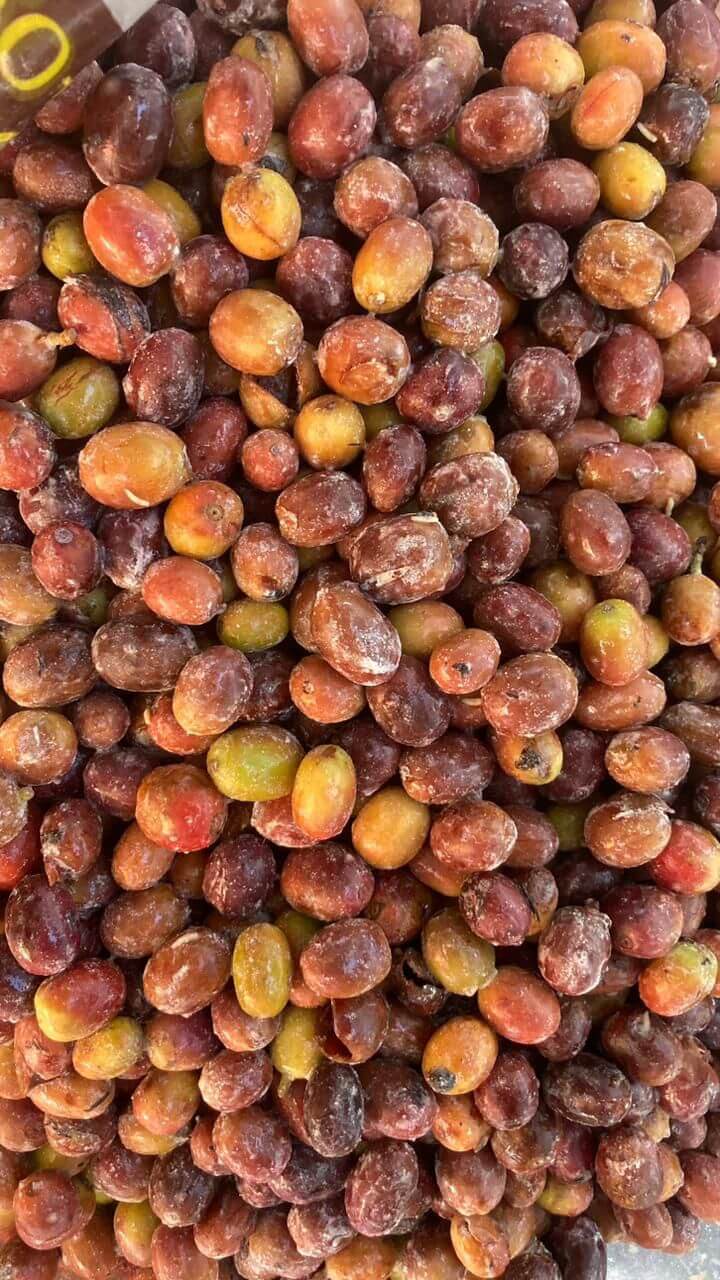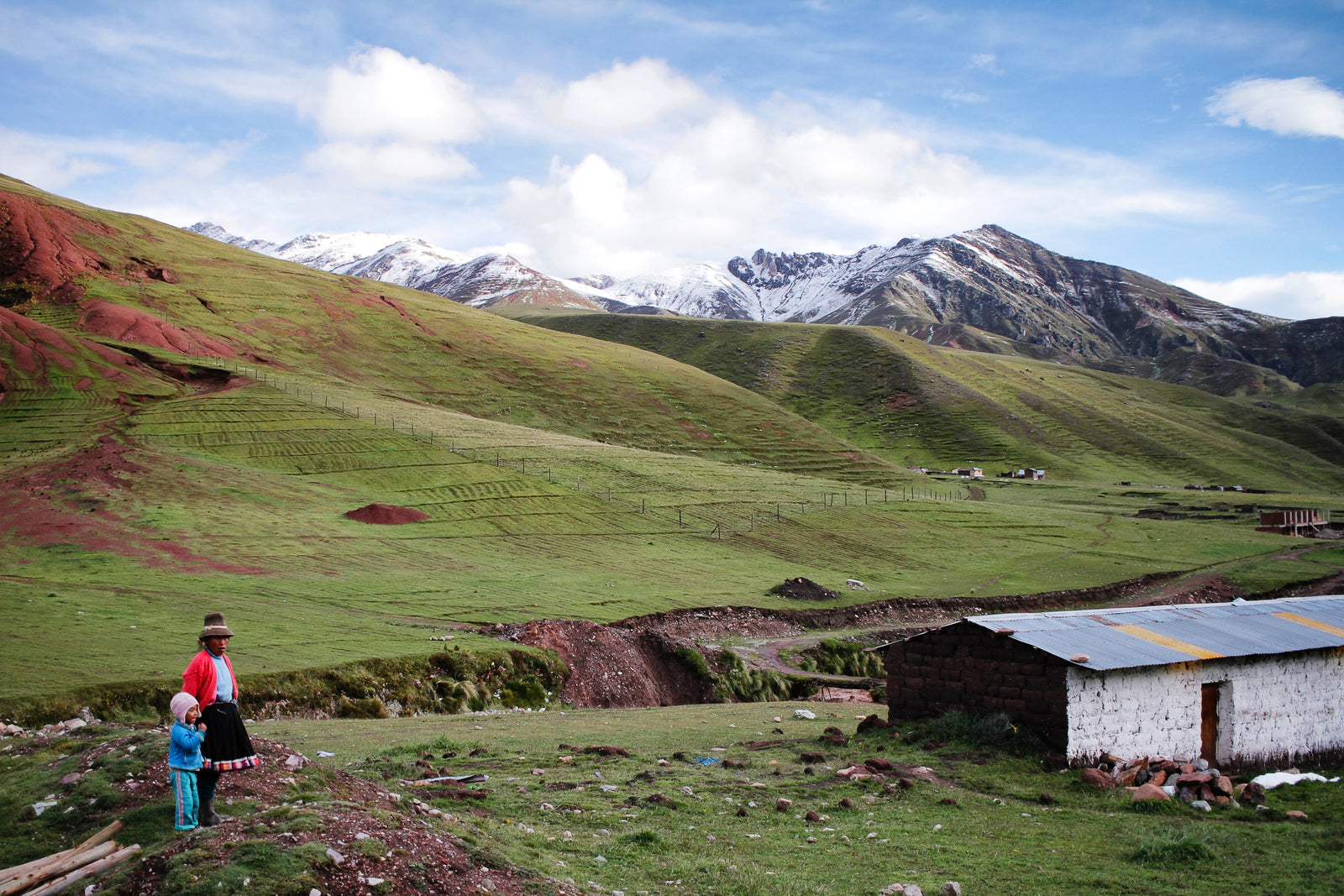Alex brings a unique skill set, combining his understanding of agronomy from his dairy farming background with the intricacies of specialty coffee. His experience competing in brewer championships and his coffee qualifications make him well-equipped to benefit coffee producers and organisations in Peru.
Foundational Learning on Agriculture
Alex’s professional journey began in the world of greenkeeping, where he honed his skills through a rigorous one-year full-time course, providing him with a solid foundation in plant health, pest control, and environmental sustainability – skills that are directly transferable to coffee agronomy.
Following his greenkeeping course, Alex furthered his expertise with a two-year part-time farming course. This program included hands-on work practice which he did at his cousins farm and absolutely loved it; he has chosen this as his career path ever since.
A few of the key areas of study during this course included the principles of agriculture, farm safety, soil and environment management, pesticide use, farm performance measurement, and business planning. Combining this newfound knowledge with his existing insights in greenkeeping, Alex learned the importance of soil health and proper fertilisation, ensuring that plants receive optimal nutrients for growth.
This expertise is invaluable for coffee agronomy, where soil quality and fertilisation are crucial for the health and yield of coffee plants. Additionally, his skills in pest and disease management, developed through both greenkeeping and farming training, enable him to effectively understand how common coffee pests and diseases can occur, and minimising crop loss and enhancing plant health is crucial.

Coffee Enthusiasm, Experience and Expertise
Alex’s journey into the world of specialty coffee began, potentially like many of us, a passion for coffee and thirst to try and learn more. His introduction to specialty coffee came through cupping sessions in and around Cork, Dublin and other cities in Ireland, this is where he tasted and evaluated different coffees, learning the subtlty of flavour notes and profiles. These sessions provided him with a deeper understanding of what specialty coffee truly is, and since that day he's been going down the rabbit hole even further.
Outside of Coffee
Beyond his impressive credentials in agriculture and coffee, Alex has a variety of interests and skills that reflect his well-rounded personality and broad expertise. His hobbies include pasta and bread making, bonsai cultivation, gardening, and scuba diving. These interests showcase his attention to detail, patience, and creativity – qualities that are also good in the field with coffee production and processing!
To engage more deeply with the local communities he wants to be a part of, Alex is currently learning Spanish. In order to have his ideas actioned and to learn from those in Peru, he's aware he'll have to have some proficiency in Spanish, while also being able to build a rapport and connect with those at origin.
Alex's Action Plan
Alex envisions a two way street in which he can learn from current coffee processing methods while also being able to add value with his expertise where possible. A few of his ideas are below:
- Calibration of Equipment - Ensuring that all processing equipment is accurately calibrated to maintain consistency and quality in coffee processing. This includes precise measurement tools for moisture content and proper maintenance of machinery.
- Correct Drying Techniques - Implementing standardised drying techniques to achieve the ideal moisture content in coffee beans, crucial for preserving flavour and preventing mold. Alex plans to introduce solar drying methods and other innovative drying solutions tailored to the local climate.
- Experimenting with Fermentation - Encouraging farmers to experiment with different fermentation methods to discover unique flavour profiles and enhance the overall quality of their coffee. Alex’s knowledge from the Q Processing Level 1 course will be key in guiding these experiments.
- Using Eco-Pulpers - Introducing eco-pulpers to replace traditional pulping methods. Eco-pulpers are more environmentally friendly, reduce water usage, and improve processing efficiency.
- Creating Compost from Coffee Pulp Waste - Promoting the use of coffee pulp waste to create compost, which can then be used as a natural fertiliser. This practice not only reduces waste but also enriches the soil, leading to healthier coffee plants and better yields.
Alex also sees significant potential in expanding the market for Peruvian coffee by targeting high-quality buyers in Arab and Asian countries. His strategy includes conducting thorough market research, building connections with buyers and distributors, and developing strong branding and marketing strategies that highlight the unique qualities of Peruvian coffee.

The Universal Agriculutral Challenges
Alex is committed to tackling some of the universal challenges faced by the agricultural sector, including:
-
Ageing Farmers - The agricultural workforce is ageing, and fewer young people are entering the profession. Alex aims to make farming more attractive to the younger generation by demonstrating the potential for innovation, profitability, and sustainability in coffee farming
-
Environmental Regulation - Stricter environmental regulations are being implemented to protect natural resources. Alex plans to help farmers comply with these regulations by adopting sustainable practices such as regenerative agriculture, reducing chemical inputs, and improving water management
- Deforestation - Coffee farming can contribute to deforestation if not managed sustainably. Alex advocates for agroforestry practices that integrate trees into coffee farms, promoting biodiversity and reducing the impact on forests

Playing a Role in The Future of Coffee and Responsible Farming Practices
Alex is a strong advocate for regenerative agriculture, a holistic approach to farming that focuses on restoring and enhancing the health of agricultural ecosystems. His expertise in this area is based on a thorough understanding of soil health, fertility, and responsible agricultural practices.
Soil Health and Fertility
Alex lives by the practices that improve soil structure, reduce soil compaction, and enhance soil aeration. Healthy soil structure is essential for root growth and water infiltration. He wants to work on solutions that create natural nutrient cycling systems through the use of compost, cover crops, and organic matter, enriching the soil and reducing the need for chemical fertilisers at the same time.
By increasing soil organic matter through composting and cover cropping, Alex believes this will create carbon sequestration, which not only improves soil health, it can mitigate impacts of climate change and also open to conversation to carbon credits as an alternative income for coffee producers.
Being a big believer in improving soil health also plays into the Regenerative Agriculture philosophy that Alex wants to contribute to, initiate and/or develop with coffee producers in Peru.

Alex's Regenerative Agriculture Systems Approach
-
Cover Cropping
Alex champions the use of cover crops to protect and enrich the soil during off-seasons. Cover crops prevent erosion, add organic matter, and fix nitrogen in the soil. This is an approach Alex has used where he planted a cover crop behind a hedge in his garden to improve the soil and control some of the weeds . Recently,
Alex has been working with a good friend of his who is dairying and they’re currently in the process of figuring out the best approach to use cover crops for their current climate in Ireland. Alex understands the principle of cover cropping as to benefit the soil and provide a way for it not to be bare . The first weeds that come up are called early successional plants and as these build, it provides fertility of the soil for the next generation of plants to come through, a technique he is ready to apply at coffee farms in Peru.
-
Agroforestry
Integrating trees into coffee farms, Alex promotes agroforestry practices that enhance biodiversity, provide shade for coffee plants, and contribute to soil health. He is yet to implement any agroforestry systems, however, he is well aware of the principles and the benefits that can be attained as he has experience with working with deciduous trees and seeing how the tree roots can break up soil compaction while also improving the water retention capacity of a soil and therefore break through the hard soil pan which restricts plants roots from growing and building deeper.
-
Planting Native Varieties
He encourages planting native plant species that are well-adapted to local conditions, which can improve resilience and reduce the need for chemical inputs. Alex has used this approach at his home farm where they planted native tree species that are suited to the climatic conditions in Ireland.
-
Hedgerow Management Techniques
The planting of native hedgerows improves biodiversity on one's farm. Alex has had quite the experience here and he has used them to act as a shelter for animals from wind and adverse weather conditions. They improve the soil health and water holding capacity of soils. Traditional management of hedgerows which is coppicing, Alex believes is applicable to coffee trees and also another management technique called pollarding. The native art of hedge laying is where the main stem is partially cut and is bent to a 45 degree angle while the next tree is laid onto this, bound together, in between stakes to stop the tree coming loose from the hinge wood.
These management techniques, Alex has used to ensure vitality of the hedgerows and to rejuvenate them and improve their overall health. The risk of not implementing this technique is that the hedgerow would become trees and end up leaving gaps, making it unsuitable for nesting birds. With no birds nesting this restricts biodiversity and reduces the resilience levels of the farm.
-
Natural Pest Control
Alex supports using natural methods to control pests, such as introducing beneficial insects and practising companion planting, which can reduce reliance on pesticides and create a healthier ecosystem. He has seen this approach used locally to him in Ireland by using biological controls such as the dock beetle to control the dock weed and in a greenkeeping context using nematodes to control leatherjackets (larvae of crane flies).
A Regenerative Agriculture Future
His advocacy for regenerative agriculture focuses on enhancing soil health, fertility, and best practices like cover cropping, agroforestry, and natural pest control. Alex's understanding and experience with innovative techniques, such as electroculture and integrated pest management (IPM), along with his commitment to agricultural principles, further demonstrate his dedication to adding value and improving a coffee farms quality.

The Ask
Alex’s adaptability, diverse expertise, and innovative approaches make him a potentially valuable partner in our perspective for coffee producers in Peru. He invites them to collaborate with him and make the most from his unique blend of skills and experience, ensuring a two way benefit and prosperous future for himself and the coffee producers.
To contact Alex you can reach him at alexanderlehane1@gmail.com or drop us a message and we can introduce.





